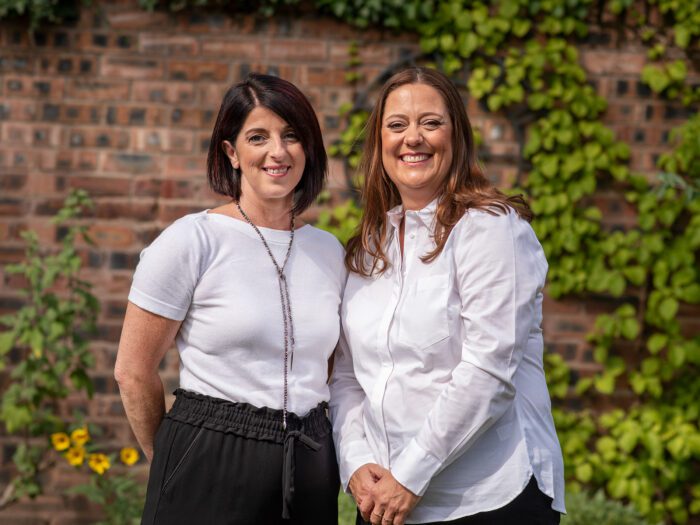
Lesley Spellman, left, and Ingrid Jansen
How to get your family onboard with decluttering
Ingrid Jansen and Lesley Spellman are the UK’s leading authority on decluttering and organising your home as The Declutter Hub, which boasts a top one percent podcast. They’re also the authors behind the bestselling Bloomsbury book Reset Your Home, Unpack Your Emotions And Your Clutter, Step By Step.
When clutter isn’t the main problem, it’s people!
At the Declutter Hub, we always say: clutter is rarely just about stuff.
It’s about time, emotions, habits, and even people get thrown into the mix.
Sometimes the hardest part of a decluttering journey isn’t the overflowing wardrobe or the chaotic kitchen drawers… it’s the emotional struggles that come from dealing with other people.
Whether it’s a partner who’s not on board, kids who resist every one of your suggestions to let something go, or family and friends who make unwanted and back-handed comments (or even worse, offload stuff you don’t want on you).
People can be a major part of the puzzle and the pain.
So, how do you stay on track when the people around you seem to be standing in your way?
Let’s break it down.

Ignore the judgement
People who have a constant struggle with their home often carry a deep weight of shame.
Not just about their clutter, but also what others think of their clutter.
Maybe a partner constantly criticises the state of the house.
Maybe a parent labelled them “the messy one” decades ago. Maybe neighbours have made back-handed comments.
Or maybe no one’s said a word… but they still feel judged.
The truth is that any judgment, whether it’s real or perceived, can leave a lasting scar.
It can crush your confidence and make you feel like change isn’t possible.
But it is. You’re not your clutter, and your worth isn’t definitely not defined by how tidy your home is.
Ask for support
Decluttering is personal. It’s often overwhelming.
And if the people in your life don’t understand what you’re doing or why you’re doing it, they’re much more likely to dismiss, sabotage, or simply ignore your efforts.
That’s why clear, honest communication is key.
Don’t just say, “I’m decluttering the house,” tell those you love why it’s important to you right here right now.
“I’ve decided I want our home to feel calmer and more functional. I’m starting by clearing out things I don’t use or love. It’s emotional and a bit scary, so I’d really love your support.”
Be specific. Tell them what you need.
Do you want practical help sorting a garage? Emotional encouragement after a tough day? For them to stop bringing in more ‘bargains’ from the charity shop?
Spell it out.
People aren’t mind readers, and most do want to help when they understand your struggles and your goal.
But people don’t always hear you
But what if your family doesn’t believe you’ll stick to it?
Maybe you’ve tried before and lost momentum.
Maybe they’ve heard you say “I’m sorting the garage this weekend” a dozen times and nothing’s changed.
They might roll their eyes or say, “We’ll see how long it lasts this time before we are back to square one.”
It hurts. It’s demotivating. But it doesn’t mean you should stop.
This time it can be different. If you arm yourself with the right tools.
If you plan, be realistic, take things one step at a time and work at your pace, there’s no need for you to go back to Square one.
Show them you mean business and are determined.
Start small and build your decluttering muscle. Your progress will speak louder than any promise.
The hand-me-downers
“Oh, I thought you might want this!”
We’ve all heard it. A well-meaning friend or relative turns up with a bag of random bits,‘useful’ gadgets, ornaments, clothes the kids have outgrown.
They’re being generous, but their generosity often adds to the problem.
Here’s the thing: people give for many reasons. Guilt. Nostalgia. The urge to offload their own clutter.
But you don’t have to say yes – you can appreciate the thought without taking in the things.
Try saying:
“Thank you so much for thinking of me. I’m really working on having less stuff right now, so I’m being super intentional about what comes in.”
Setting boundaries is hard and takes practice, but it’s worth it.
You’re protecting your home, your progress and your sanity. Put yourself first.
Going behind your back
We can’t talk about people and clutter without addressing something we sadly hear far too often: someone throwing out your things without permission.
It may have happened when you were a child, or in a past relationship.
And while the items may be gone, the sense of violation often lingers for years, even decades.
It can create serious trust issues and make it difficult to let anyone help, even in a supportive way.
If this happened to you, please acknowledge it wasn’t your fault.
You didn’t overreact by caring about those things.
Your feelings were valid then and they’re valid now. Healing from that may mean being extra cautious, taking back control, and only working with people who truly respect your boundaries.
A plan of action
If all of this sounds familiar, if the people around you just don’t get it, how do you make progress?
Here are some practical ways to navigate tricky relationships while keeping your decluttering journey on track:
1. Start with your own stuff
Focus on what you can control. Your wardrobe. Your bedside drawer. Your paperwork.
Let others see the changes happening and the impact it’s having on you.
2. Communicate what you need
Be specific. Do you need space, support, encouragement, or hands-on help? Spell it out.
And if you need them to not do something (like bringing more stuff in), let them know kindly but firmly.
3. Avoid blame
Try not to say “You never help” or “You’re the reason this house is a mess.”
Instead, say: “I’d love us to work together to make things calmer around here.”
You’ll get a lot further with a positive rather than negative spin.
4. Celebrate with your kind of people
If your family doesn’t cheer you on, find someone who will.
Our membership and Facebook group are full of cheerleaders who get it and love seeing before-and-after photos, no matter how small the win.
Finding your people is EVERYTHING when it comes to a decluttering journey.
5. Be patient
Change takes time. Many partners (and even kids) come on board eventually, but only when they see the benefits: less stress, more space, and a happier home.
Let them come to it in their own way in their own time.
Final thoughts
You might feel like you’re on a decluttering journey alone but you’re not.
It’s entirely possible to transform your home and your clutter mindset.
You may think that what you are doing is just clearing out a drawer, but with every unwanted extra pair of socks you find takes you one step closer.
And if your family or friends still don’t understand? That’s okay. Because we do.
The Declutter Hub community is full of people who’ve faced the same struggles and come out the other side lighter, calmer, and more confident.
So go at your pace. Take the lead. You never know who you’ll inspire along the way.
Ingrid’s summer tip for a clutter free home
“Don’t put it down, put it away.”
It’s simple, but it’s a game-changer.
One of the easiest ways to reduce clutter is to make a conscious choice every time you finish using something. Instead of dropping it on the side “for now,” take the extra 10 seconds to return it to its home.
Tiny actions, repeated often, create a lasting impact. Your future self will thank you for it.
Lesley’s words to declutter by for the summer
“Done is better than perfect.”
READ MORE:




